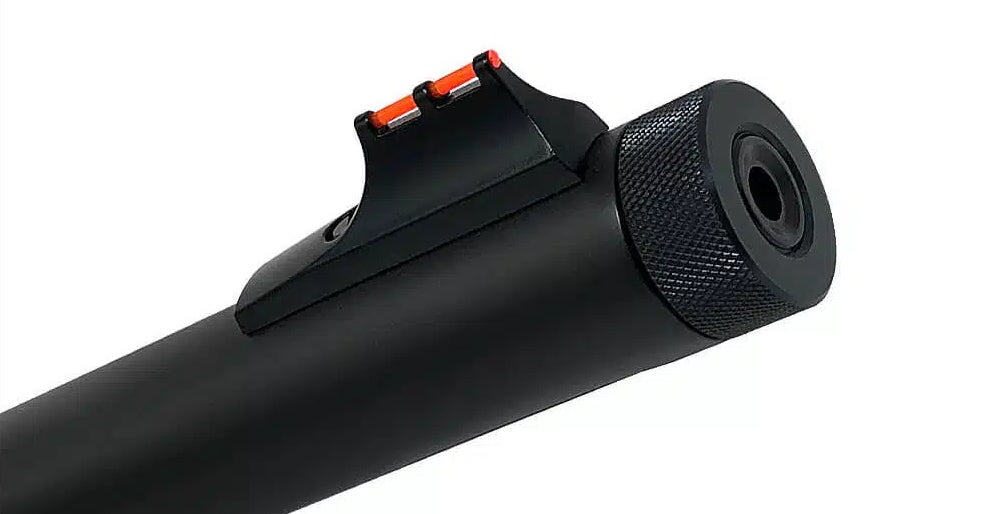Barrel Threading: Pros and Cons

FJ Fedderson makes threaded barrels for a variety of firearms. F.J. Fedderson
We may earn revenue from the products available on this page and participate in affiliate programs. Learn more ›
Barrel threading has become almost standard practice for new hunting rifles in recent years. Even some new lever-guns come with a threaded barrels these days. We can probably thank the popularity of suppressors for this, and generally speaking, it’s a good thing. Done right, barrel threading doesn’t hamper accuracy, and why not have the option to add a muzzle device to your rifle?
But what if you have an older rifle that you just love, and you’re thinking about threading the barrel? Is it worth it? How difficult is it to do? Here are some pros and cons of barrel threading in general, and a break down of whether having it done to an existing rifle is a good idea.
Barrel Threading: The Basics
Barrel threading refers to when a gunsmith or manufacturer cuts threads into the outer surface of the muzzle end of a gun barrel. They do this to allow shooters to attach muzzle devices, including suppressors, muzzle brakes, flash hiders, and compensators. If you’re shooting your rifle without a muzzle device and it has a threaded barrel, you’ll want to keep a thread protector on it. The good news is that these protectors are almost always provided by the manufactuer, so you just need to keep it in a safe place when it’s not on your rifle.
Barrel threads are usually cut to certain specifications so that many devices can work on the same rifle. A common thread pitch for rifle barrels in the U.S. is ⅝x24. But there are a lot of patterns out there, so it’s important to know what’s on your gun before buying a muzzle device, just as it’s important to have your gunsmith cut threads on an existing rifle in a way that matches the muzzle device you want to put on the gun.
Barrel Threading: Table of Contents
Pros and Cons
Other Considerations
How to Get Your Barrel Threaded
How Much Does It?
Barrel Threading: Pros and Cons
When done right, barrel threading will not affect accuracy. Done wrong and the results can be bad. That’s why its best to go to an experienced gunsmith. DIYers can end up damaging the rifling in the end of the barrel, damaging the crown of the barrel, or cross-threading the barrel which damages the threads and makes them unusable. When done professionally, though, the process has a lot of plusses. You can attach suppressors and muzzle brakes to your rifle making it either quieter, reducing recoil, or both.
Some firearms may need an entirely new threaded barrel, like this Glock 45. Jarvis Inc.
The drawbacks depend on a few things. Barrel threading is against the law in some states for certain guns, so you need to be familiar with regulations otherwise, you could make your favorite gun illegal. It can also devalue a gun faster than you can pull the trigger. It may be an improvement in some people’s eyes, but in the eyes of a collector, it can be seen as a big problem. If you’re considering threading the barrel of a collectible rifle or one you want to sell one day, don’t do it.
There are some cases where a thread protector on a barrel or muzzle device can throw off your shot, but this is rare. It happens most often when the thread protector comes a little loose and disrupts the harmonics of the barrel. A good practice is to check that your thread protector or muzzle device is always tight.
Barrel Threading: Other Considerations
You may not be able to thread the barrel on your gun because it would interfere with how the gun works. Most pistol barrels are too short to thread and require adapters or an entirely new barrel with threads already cut into it. Attaching a muzzle device also can interfere with your sights. Firearms configured for suppressors generally have taller sights to accommodate the extra height of a suppressor in front of the muzzle. If you have a gun with sights that are milled directly into the slide or barrel, this can pose an issue.
This rifle barrel was threaded for a muzzle brake to reduce recoil. Heritage Arms Inc.
Guns with front sights can also be a problem if the length of the barrel in front of the sight is too short to accept threads. In that case, you can cut off a few inches of barrel behind the sight and have the barrel threaded, then have the sights put back on behind the threads. This will mess with your zero and possibly your sight picture, so you want to talk to a gunsmith before breaking out the hack saw.
Finally, you want to consider how long your barrel is compared to the device you plan to use. Those using suppressors might want to consider shortening a barrel along with threading it to keep the overall length of the gun to a minimum. The downside to this is that you may sacrifice some muzzle velocity, but with many cartridges, this is not a deal-breaker.
Read Next: Muzzle Brake vs Compensator: What’s the Difference?
How to Get Your Barrel Threaded
An experienced gunsmith is the best person to thread a barrel. They have the tools and the knowledge to do the job right. There are many gunsmiths online and IRL that offer barrel threading. You can also work through a company like Silencer Central to get the job done.
Many gunsmiths will simply take your gun and hand you the same gun back with a threaded barrel a few weeks (or a few months) later. Some require that the gun be stripped of every part except for the barrel and the action before shipping. If you don’t know how to do this, refer to your owner’s manual or contact the manufacturer.
How Much Does it Cost to Have a Rifle Barrel Threaded?
Barrel threading can cost anywhere from $65 to $200 or more, depending on how complicated the job is. Smiths who only take barreled actions only are usually cheaper because they don’t have to take the gun apart and put it back together. You’re paying for a gunsmith’s time by the hour, so the more work you can do ahead of time, the better.
Complicated jobs like moving front sights and shortening barrels get more expensive, but not prohibitively so. In general, barrel threading is a quick, simple job for those who know what they’re doing.
The post Barrel Threading: Pros and Cons appeared first on Field & Stream.
Articles may contain affiliate links which enable us to share in the revenue of any purchases made.
